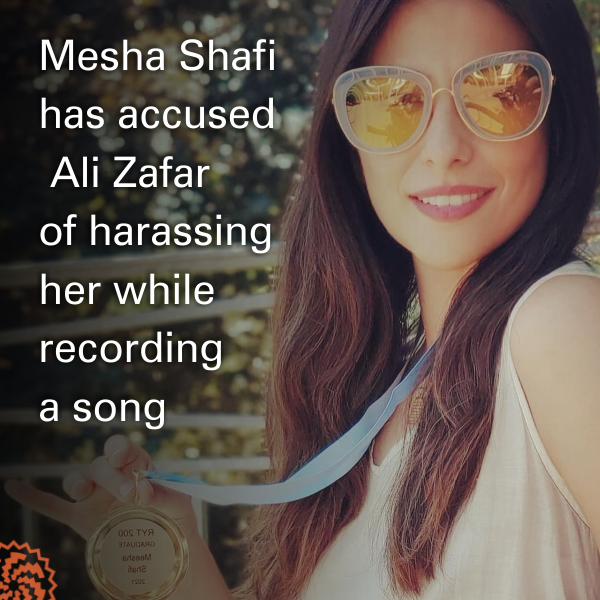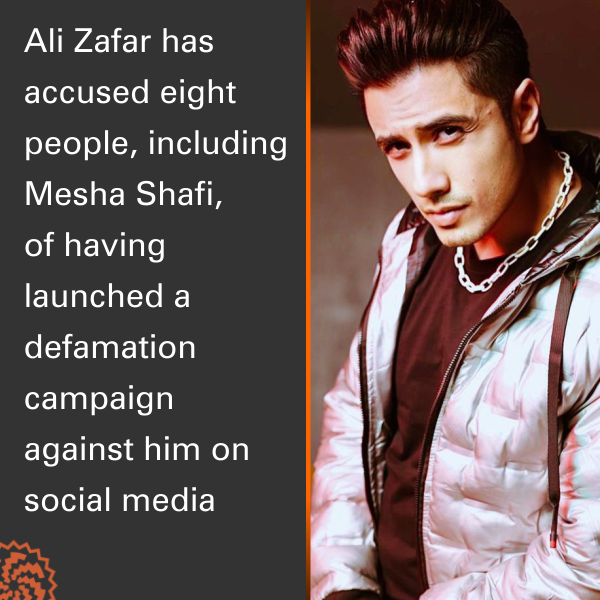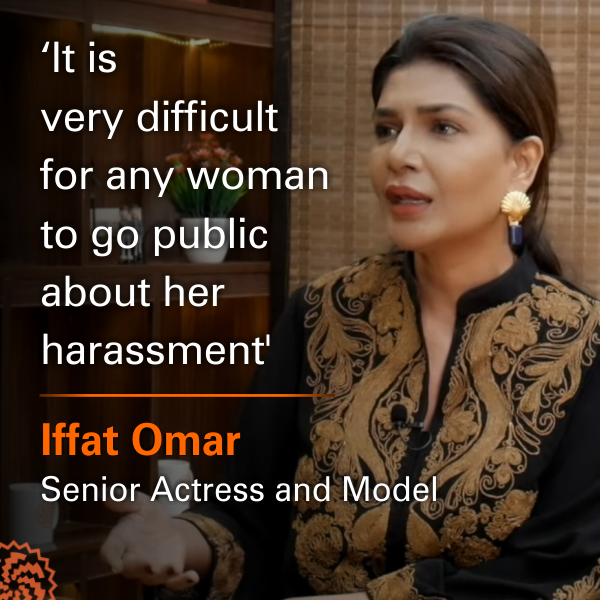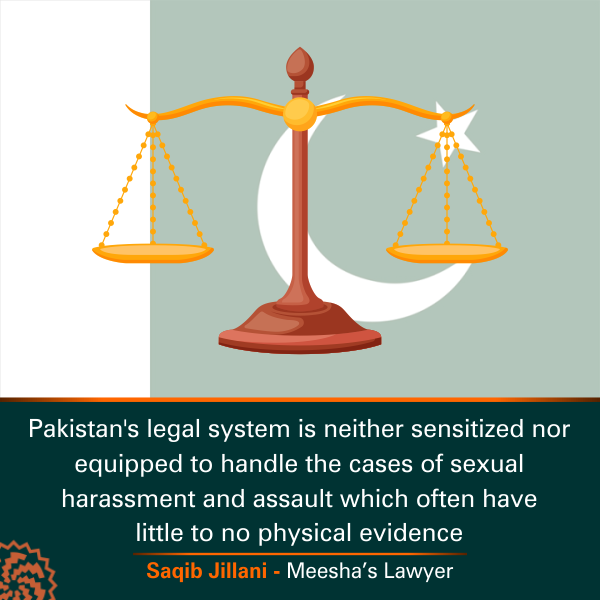Iffat Omar is no stranger to controversy. Her show, paas kar ya bardasht kar, aired by Sujag for many months between 2019 and 2020, was nothing if it was not controversial. Shooting straight and taking no prisoners, she would criticize the ruling Pakistan Tehreek-e-Insaf as passionately as she would expose many social taboos – including but not limited to misogyny and crimes against women.
As a senior actor and model, she also has the social heft to comment on anything and be heard. So, it was not utterly unexpected when, in April 2018, she made a tweet supporting the Me Too Movement that encourages women to name and shame their harassers and tormentors. Referring to the challenges women in Pakistan face when they want to disclose the identity of those who have assaulted them, she wrote: ‘It is very difficult for any woman to go public with something like this’.
Her tweet also had a specific context. Only a few days earlier, singer Meesha Shafi had accused a male singer and actor, Ali Zafar, of harassing her while they were recording a song together.
Iffat Omar could never realize that her tweet, rather than being seen as a comment on the state of women in Pakistan, would be used by Ali Zafar as the basis of lodging a complaint against her with the cybercrime wing of the Federal Investigation Agency (FIA). The complaint stated that her tweet should be considered as a crime aimed at defaming him.
Leena Ghani, too, is known for taking strong stances on women’s rights which, for most Pakistani men, is a controversial subject in itself. She works as a make-up artist in the fashion industry and is also a part of the organizing committee of Aurat March, a women’s movement in Pakistan. Around the same time as Iffat Omar made her tweet, Leena did the same. She lauded the ‘courage’ and ‘bravery’ of those who speak up against their harassers. She also claimed that she, too, was harassed by Ali Zafar. A few months later, she, too, would face an FIA investigation over whether she had committed the crime of defaming him.

The same thing happened to Syed Faizan Raza, a student known in Twitter circles for his controversial views on social and political topics. He not just wrote a tweet in favor of the claims of harassment made against Ali Zafar, but also criticized the singer for snubbing those who were making those claims. He also faces the charge of defaming Ali Zafar with a criminal intent.
Six other people, including Meesha Shafi, have been booked in the same case. Ali Zafar has accused them all of having launched a ‘smear campaign’ against him on social media.
One of them, Humna Raza, has apologized to him recently. In a letter posted on Twitter, she retracted her allegation that she felt uncomfortable while taking a selfie with Ali Zafar some years ago. “I would like to clarify that it was a confusion on my part that I had obviously misunderstood,” she stated. “I shouldn’t have tweeted something so misleading and I am aware of how it was blown out of proportion… [and] used against Ali Zafar, damaging his reputation.”
Sujag’s investigations suggest that at least three other people booked in the same case thought of doing the same: apologizing to Zafar, and thus getting out of the trouble the proceedings of the case might cause to them. A fourth person, too, was seriously concerned about the consequences that the case might have for their job and life prospects. If convicted, they thought, they might have to go to jail which, in turn, could hurt their career and impact their personal life.
The ‘crime’ of commenting
Ali Zafar lodged his criminal defamation complaint in November 2018. FIA then initiated an investigation into his complaint and sent out notices to all the nine people he had named in his complaint.
Asif Javed, a Lahore-based FIA official who was assigned to investigate the complaint, says he duly informed all the accused that they needed to appear at his office to have their statements recorded.
The accused, on the other hand, point out multiple problems in the investigation process. Firstly, most of them say, the notices reached them after the day they were supposed to appear before Asif Javed. Secondly, some of them do not live in Lahore, which was why they couldn’t mobilize on time and appear at FIA’s Lahore office.
More importantly, as almost all of them complain, the notices did not have the detail of specific allegations against them. They had to find out about them on their own -- through lawyers, by making phone calls and sending emails to FIA official and, in some cases, by appearing in person at the FIA office in Lahore.
Those who ultimately managed to record their statements -- Iffat Omar being one of them -- believe that it was a mere formality. They report being repeatedly told that their responses to FIA queries were ‘unsatisfactory’ though, they say, nobody explained to them as to why it was so. Going by the investigation officer’s own words, he found the responses to be based on personal opinions and not backed by any evidence.
The problem with this approach is that it is insensitive towards the nature of the allegations against Ali Zafar. As is obvious from Humna Raza’s letter of apology to him, being uncomfortable or harassed is a feeling. Most of the time, if not always, it cannot be proven with tangible evidence. This raises an important legal question: Why should those sympathizing or empathizing, rightly or wrongly, with someone feeling harassed be expected to prove that their support is based on some verifiable piece of evidence? Isn’t being supportive to someone a feeling too – something that does not need to be based on provable facts?
Asif Javed, the investigation officer, does not offer any answer to such questions and insists that FIA can only base its proceedings on evidence. He claims that none of the people whose statements he has recorded have any evidence to back their comments and opinions about Ali Zafar.
Now that Asif Javed has completed his investigation, FIA’s cybercrime wing has registered a First Information Report (FIR) against Meesha Shafi, Humna Raza, Maham Javaid, Leena Ghani, Iffat Omar, Syed Faizan Raza, Fariha Ayub, Ali Gul Pir and Haseem Zaman Khan. They have been booked under Section 20 (1) of the Prevention of Electronic Crimes Act (PECA) and Section 109 of the Pakistan Penal Code (PPC).
The first section pertains to “intentionally and publicly” exhibiting or displaying or transmitting “any information through any information system, which [a person] knows to be false, and intimidates or harms the reputation or privacy of [someone else]”. Those found guilty under this section “shall be punished with imprisonment for a term which may extend to three years or with fine which may extend to one million rupees or with both”.
The second section cover “an act or offence” committed “in consequence of the instigation, or in pursuance of the conspiracy, or with the aid which constitutes the abetment.” The punishment under this section is not specified and could be the same as awarded in the offence which has been abetted.
The original ‘sin’
In April 2018, Meesha Shafi took to Twitter and claimed to have been harassed by Ali Zafar on multiple occasions. The allegation took the social media and entertainment industry by storm. It also set the ball rolling for the MeToo Movement in Pakistan, as numerous others started sharing similar experiences on Twitter and other social media platforms. Besides Ali Zafar, several celebrities, including a newspaper publisher, were subsequently accused of having harassed their fans, colleagues and/or subordinates.

As the movement picked up momentum, commentators and public personalities also started commenting on it. While many dismissed it as a misguided attempt to question the long-established gender roles and norms in Pakistan, others found merit in the allegations of those who were coming out against various powerful individuals. The latter groups thanked Meesha Shafi for her ‘courage and bravery’, for being the first to utter something that is hard to say in a patriarchal society like Pakistan, where women are not supposed to display their physical and sexual travails in public – which are even harder to prove.
Pakistan’s legal system is “neither sensitized nor equipped to handle the cases of sexual harassment and assault which often have little to no physical evidence”. There is a general perception that the tone of the investigations is often not only intimidating but also disparaging towards women.
Meesha Shafi then lodged a case with Punjab’s provincial ombudsman against Ali Zafar under the Protection Against Harassment of Women at Workplace Act. The ombudsman ruled that taking up her case was beyond his jurisdiction because the alleged incident of harassment took place at a private studio which cannot be categorized as a ‘workplace’ as defined by the act mentioned above.
Meesha Shafi challenged the ombudsman’s ruling first before the Punjab governor and then at the Lahore High Court – but both these forums upheld the earlier decision that the venue of the alleged harassment did not constitute the definition of workplace, and thus, her case fell outside the purview of the Protection Against Harassment of Women at Workplace Act. She has now challenged these rulings at the Supreme Court which is yet to initiate proceedings on her application.
Ali Zafar, meanwhile, lodged a civil defamation case against Meesha Shafi in November 2018, seeking one billion rupees as compensation for the alleged damage done to his reputation. In September 2019, Meesha Shafi, too, filed a civil defamation against Ali Zafar, demanding a compensation of two billion rupees for the damage done to her reputation due to the lopsided media coverage of her harassment case, and the psychological trauma she suffered as a result of that. The proceedings, in this case, have been put on hold till the time a final decision is made on the harassment case she has lodged.

In the presence of so many cases, why did Ali Zafar need to lodge a criminal defamation case as well? If one reads the text of the sections of law deployed by FIA in the case, it becomes apparent that he and his legal team are trying to portray comments made by different individuals at different social media platforms as part of some conspiracy hatched by Meesha Shafi in which others collaborated willingly in order to harm his reputation.
From what the FIA’s investigator has told Sujag, it is apparent that he did not probe whether all those named as accused in the criminal defamation case were acting in unison – as part of some concerted campaign -- or whether they were randomly commenting on the same thing at around the same time – only because it was the talk of the town then.
As is apparent, Asif Javed, instead, only focused on whether their comments were backed by evidence or not. His narrow focus – as well as a tweet by another FIA officer which many women’s rights activists interpreted as a partisan endorsement of Ali Zafar’s stance – are seen by Meeshsa Shafi’s supporters as a proof of the complicity between the singer and FIA. Many of them say in their private conversations, though none of them wants to be quoted by name due to the controversial nature of the case, how the entire probe and its procedures are skewed against the accused. ‘They have neither been informed about the allegations against them properly and in detail, nor have they been given any evidence that shows that they all acted in tandem,’ is what one hears from most of them.
Some people also point to other recent cases to suggest that FIA has never been as active in them as it has been in the one filed by Ali Zafar. They cite the example of a Lahore resident, Ramsha, who committed suicide after FIA repeatedly declined her request to investigate and prosecute her tormentor, Ali Niazi, who had forced her to pay him 16,000 rupees by threatening her that he would post her photos on social media.
Scare tactics?
Saqib Jilani, who is a part of Meesha Shafi’s legal team, claims that FIA has denied her lawyers access to the details of the investigation in spite of multiple requests by them. He also believes the criminal defamation case lodged by Ali Zafar is an “intimidation tactic to coerce witnesses into retracting the statements they have made in favour of Shafi’s claims of harassment”.

The lawyer also believes the filing of a criminal defamation case against his client -- while the decision on the civil defamation case against her is still pending -- is meant to pressure her into silence. This brings us to a basic question: What should a woman do if and when she feels harassed? Should she expect any help from the state institutions – if not from the rest of the society?
Saqib Jilani answers this by stating that Pakistan’s legal system is “neither sensitized nor equipped to handle the cases of sexual harassment and assault which often have little to no physical evidence”. There is a general perception that the tone of the investigations is often not only intimidating but also disparaging towards women. Instead of paying heed to the gravity of the complaint, demeaning questions are asked regarding the conduct and reputation of the victim.
Observers also points out that investigators often make unsolicited remarks about the attire, appearance or character of a victims of harassment or assault – as has been obvious from the remarks made by Lahore police chief after last month’s gang-rape of a young woman near Lahore. This, according to them, discourages the reporting of harassment, abuse or rape.
Stay silent, women – that is the message the state seems to be conveying to people like Meesha Shafi and to those who want to stand up for her.
This report was first published by Lok Sujag on 12 Oct 2020, on its old website.
Published on 31 May 2022




















